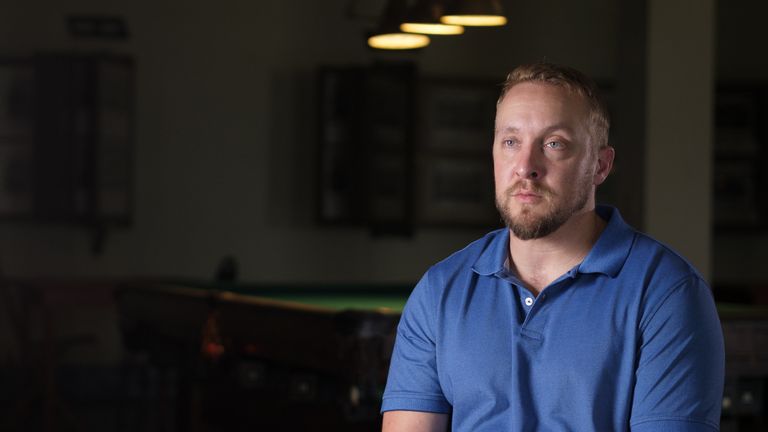Many of the 2,312 US military personnel who have been killed on duty in Afghanistan are buried in Arlington Cemetery, Virginia.
Row upon row of white gravestones stretch into the distance, each of them representing a family ripped apart in a matter of seconds by events in a foreign land.
But few have suffered a tragedy as great as the Wise family. Mary and Jean Wise had to endure the constant concern of all three of their sons – Jeremy, Ben and Beau – enlisting in the armed forces and doing tours of Afghanistan.
Only one survived the conflict.
Beau Wise was the youngest of the three, 10 years Jeremy’s junior, and grew up in awe of his siblings.
“I was so much younger and so much smaller than them,” he says, “To Jeremy, I was kind of a pet. He loved taking me places and would give me caffeine or sugar and just let me go. It was his entertainment, I think.
“The most physical relationship was between myself and Ben. I grew quick and eventually I started stealing his clothes and a fight would ensue here and there.”
Beau is hunched over the counter, doing the accounts at the liquor store where he works, which is owned by his father-in-law.
It’s sandwiched between a petrol station and a Mexican fast-food restaurant at the side of the freeway in Oklahoma – bars on the windows to deter thieves.
He moved across the country to rebuild his life with his wife, Amber, after grief took over – the pain of losing two brothers almost too much to bear.
Ben had been the first to sign up, joining the army in 2000 aged 23. Jeremy enlisted in the navy, aged 27, despite being enrolled in medical school at the time, shortly after the 9/11 attacks.
“That was a bit of a shock because who turns their back on med school?” Beau asks, but soon he was following their career path.
“I was hearing Jeremy’s stories and feeling pretty envious,” he says, “I just wanted to be shooting machine guns and blowing things up.”
Beau joined the marines aged 24, in 2008, a decision that devastated his parents initially.
“They fought it pretty hard,” he says, “My mum actually refused to feed me for a little while. It was a bluff, she came around. But I understand the worry, especially when the deployments started, they had a minimum of one son gone at all times.”
He was stationed in Helmand Province, Afghanistan, in 2009 when he learned Jeremy had been killed by a suicide bomber attacking the CIA base in Khost in the southeast of the country, an attack which left seven Americans dead.
“We were supposed to be on patrol that morning,” he says, “and it suddenly got cancelled. I was taken back to the battalion, a door swung open, and immediately I recognised the gentleman who was our battalion chaplain.
“He said: ‘I don’t want to waste too much time with this, is your brother, Jeremy Jason Wise? It’s my unfortunate duty to inform you that he’s been killed to some kind of explosion, and that is literally all that we know.'”
The coffin containing Jeremy’s body was lifted from a plane, draped in the stars and stripes, at Dover Air Base in Delaware.
Beau remembers Ben turning to him and remarking that he was now the eldest Wise brother. Soon that title would, sadly, belong to Beau.
Ben died on 15 January 2012, after fighting for his life for six days, both legs amputated as his blood turned septic. Ten rounds of bullets had been pumped into his body by a Taliban fighter hidden in a cave.
“I was able to get to the hospital in Germany with his wife, Traci, to say goodbye,” Beau says. “I think as a Marine infantryman to some extent, I’ve always been able to say, ‘I get it’. It’s the nature of the jobs that we chose and what we did and every deployment is a roll of the dice.
“I think the thing I felt most guilty about was that I wasn’t a parent and that Jeremy and Ben were. All out hearts were broken for their boys Luke [Jeremy’s son] and Ethan [Ben’s son].”
Beau turned to alcohol as a way of processing his grief and the added heartbreak of realising he and his wife, Amber, couldn’t conceive naturally.
“I left active duty and went reserve. I was just trying to reinvest in my marriage and be a better husband and be the man that she deserves and give her just half the support that she’s given me through all of this.
“She’s my best friend and I would have been done a long time ago if it weren’t for her.”
Sole survivor status was placed on Beau, a concept made famous by the film Saving Private Ryan. He was told by then Marine Commandant General James Amos that he would not be put in harm’s way, the only service member to be kept from combat in the Afghanistan war for that reason.
“I was frustrated about the sole survivor at the time, but being a parent now definitely lends a perspective,” he says. “If it were my children, I would absolutely want them taken out of harm’s way.”
Beau and Amber have now adopted two children, Zac and Sarah. The family are now settled in Oklahoma but with the news of the withdrawal of US troops from Afghanistan comes a period of contemplation for Beau, whose family have made the ultimate sacrifice.
“I have so many questions,” he says, “at the end of it, time will tell. There is quite a bit of relief, maybe it is time to come home.
“The question is how to help sustain the stability of the region and concern for some of the interpreters that have been alongside us for 20 years, they put their necks out for us on patrol. For us, it’s over after seven months, for them, it’s 365 days. In particular, the two guys I worked with the bulk of my two deployments, I hope they’re both home and safe.”
As for his brothers, Beau believes they would do it all again.
“At the funerals, and the memorial services I run into people from the Green Berets, Navy Seals or CIA or whoever and they have said to me: ‘I wouldn’t be here if it weren’t for Jeremy. I wouldn’t be here if it weren’t for Ben.’ I think with that knowledge, they would do it again in a heartbeat.
“We were not just taking lives, but saving lives and that was something that Jeremy and Ben both excelled at.”














